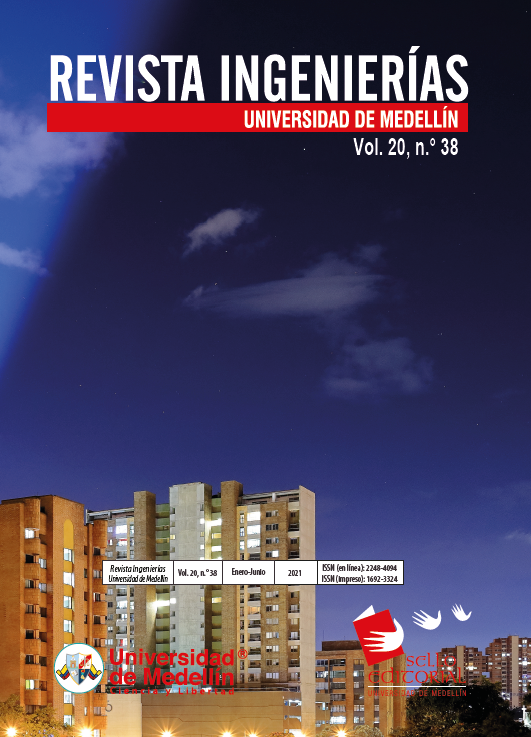Coffee Fun: Gamified Tool Based on the SUM Agile Development Methodology For Video Games*
Main Article Content
Abstract
In recent years, serious games have been applied in different contexts of application, highlighting their contribution in the educational context. This original type article presents the design, construction and evaluation of the Coffee Fun video game. Coffee Fun is a video serious game aimed at children aged 8 to 12 years old; the game has as a theme the growing of coffee beans in a simulation environment in which each player helps the growth of this plant by a few tools provided at each level of the game; in the game, different scenarios related to coffee growing environments are presented for each of its stages in a series of levels that the player must overcome to complete the game through a process of learning and entertainment.
Article Details
References
J. Arcila, F. F. Farfán, A. M. Moreno, L. F. Salazar, and E. Hincapié, 'Sistema de producción de café en Colombia,' Manizales, 2007. [Online]. Available: https://biblioteca.cenicafe.org/handle/10778/720
N. Acerenza et al., 'Una metodología para el desarrollo de videojuegos,' in 38° JAIIO -Simposio Argentino de Ingeniería de Software, 2009, pp. 171-176, [Online]. https://www.fing.edu.uy/sites/default/files/biblio/22811/asse_2009_16.pdf
X. A. Murillo-Sanchez, A. L. Gutierrez-Rocha, A. W. Ibanez-Illanes, J. A. Quiroz-Perez, G. Sahonero-Alvarez, and F. R. Diaz-Palacios, 'Implementation de la metodologia SUM modificada para el desarrollo de videojuegos orientados al aprendizaje en Bolivia,' Cisci 2018 - Decima Septima Conf. Iberoam. en Sist. Cibern. e Informatica, Decimo Quinto Simp. Iberoam. en Educ. Cibern. e Informatica, Sieci 2018 - Memorias, vol. 2, July, pp. 144-149, 2018.
C. Espinal, H. Martínez, and X. Acevedo, 'La cadena del café en Colombia: una mirada global de su estructura y dinamica 1991-2005,' 2005. [Online]. Available: http://bibliotecadigital.agronet.gov.co/handle/11348/6111
C. López Reventon, 'El videojuego como herramienta educativa. Posibilidades y problemáticas acerca de los serious games,' Apertura. Rev. innovación Educ., vol. 8, no. 1, pp. 1-15, 2016, [Online]. Available: http://www.scielo.org.mx/pdf/apertura/v8n1/2007-1094-apertura-8-01-00010.pdf
N. Padilla, 'El uso educativo de los videojuegos,' 2015. [Online]. Available: http://www.juntadeandalucia.es/educacion/webportal/descargas/familias-lectoras/flash/coleccion/resources/cariboost_files/cuaderno09.pdf
B. Mainer, 'El videojuego como material educativo: La Odisea,' Rev. Comun. y Nuevas Tecnol., vol. 14, no. 7, pp. 1-28, 2006, doi: 10.7195/ri14.v4i1.397.
B. Muros-Ruiz, Y. Aragón-Carretero, and A. Bustos-Jiménez, 'Youth’s usage of leisure time with video games and social networks,' Comunicar, vol. 20, no. 40, pp. 35-39, 2013, doi:10.3916/C40-2013-02-03
D. A. Albornoz, S. A. Moncayo, S. Ruano-Hoyos, G. E. Chanchí-Golondrino and K. Márceles-Villalba, 'Sistema software para la ejecución de pruebas de usabilidad bajo el enfoque de mouse tracking,' TecnoLógicas, vol. 22, pp. 19-31, 2019, doi: 10.22430/22565337.1511
D. M. Delgado, D. F. Girón Timaná, G. E. Chanchí, and K. Márceles Villalba, 'Estimación del atributo satisfacción en test de usuarios a partir del análisis de la expresión facial,' Rev. Ing. Univ. Medellín, vol. 19, no. 36, pp. 13-28, Jun. 2019, doi: 10.22395/rium.v19n36a1
G. E. Chanchí, W. Y. Campo, and L. M. Sierra, 'Estudio del atributo satisfacción en pruebas de usabilidad, mediante técnicas de análisis de sentimientos,' Rev. Ibérica Sist. e Tecnol. Informação, no. E23, pp. 340-352, 2019, Accessed: Nov. 05, 2020. [Online]. Available: https://search.proquest.com/openview/dc9c3ac1b6b131619f5c2c7bfa97c1c5/1.pdf?pq-origsite=gscholar&cbl=1006393.
G. E. Chanchi, M. A. Ospina, and J. L. Pérez, 'Sistema IoT para la monitorización de la variabilidad del ritmo cardiaco en pruebas de usabilidad,' Rev. Espac., vol. 41, no. 25, p. 2020, 2020, [Online]. Available: https://www.revistaespacios.com
G. E. Chanchí, M. C. Gómez Álvarez, and W. Y. Campo Muñoz, 'Criterios de usabilidad para el diseño e implementación de videojuegos,' Rev. Ibérica Sist. e Tecnol. Informação, no. E26, pp. 461-474, 2020.
D. Pinelle, N. Wong, and T. Stach, 'Heuristic Evaluation for Games: Usability Principles for Video Game Design,' in CHI 2008 -Conference on Human Factors in Computing Systems, 2008, pp. 1453-1462, Accessed: Mar. 05, 2021. [Online]. Available: https://course.ccs.neu.edu/is4300f16/ssl/pinelle-chi08.pdf.
S. Papaloukas, K. Patriarcheas, and M. Xenos, 'Usability assessment heuristics in new genre videogames,' in PCI 2009 - 13th Panhellenic Conference on Informatics, 2009, pp. 202-206, doi: 10.1109/PCI.2009.14





